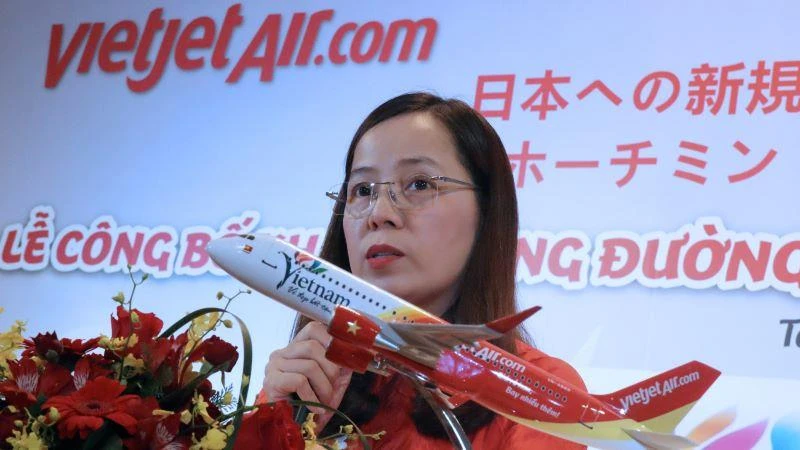
Vietnamese budget carrier Vietjet Aviation plans to launch an e-commerce platform selling everything from financial services to consumer goods as it follows Malaysian peer AirAsia in seeking new ways to profit from customer data.
Vietjet aims to roll out the service within two years, in partnership with banks, hotels and other companies.
AirAsia, on the other hand, aims to establish an online travel and fintech platform primarily through its own subsidiaries. While AirAsia says it is investing $20 million a year in its diversification effort, Vietjet declined to specify how much it is spending on its initiative.
According to Vietjet Vice President Nguyen Thi Thuy Binh, budget carriers are looking to leverage their abundant consumer data to expand their reach beyond travel and into consumers' everyday lives.
"Following our concept of 'Consumer Airline,' we will have an e-commerce platform to serve not only air tickets but whatever they need," Binh told the Nikkei Asian Review on Monday. "All the suppliers and partners will join our platform to serve the products to not only our 30 million passengers but also hundreds of millions of customers in Vietnam and other parts of the world."
Binh said the platform will cover banking, insurance and other financial services, as well as hotels, consumer goods and more. The idea is for partner companies in such sectors to join Vietjet's platform and use blockchain technology to smoothly share transactions among themselves. Vietjet said it is already in talks with some companies.
Binh said the focus for now is on selling to passengers, whose number is expected to reach 30 million in 2019, up 30% from 2018. But after two years, she believes that passengers will not be the only ones using the platform. "We are integrating companies step by step to make the system richer."
Vietjet is attempting to bolster its ancillary revenue, which is derived from sales of non-ticket products and services, as rising fuel costs put pressure on its core transport business. The company's overall air travel revenue rose 28% on the year in the first quarter of fiscal 2019, while ancillary revenue alone grew 45%.
Vietjet's platform is already starting to take off. In June, the carrier tied up with HD Saison Finance -- a joint venture between HDBank, which has the same parent company as Vietjet, and Japan's Credit Saison -- to enable customers to buy any Vietjet air tickets using loans ranging from 2 million to 15 million dong ($85 to $642). No prepayment or salary confirmation is required.
This service provides a "good chance for people who don't have enough money to buy their tickets but who want to pre-book them in advance to get a promotion fare," Binh said. "It is a new way to buy a ticket, and is one of examples of integrations with our partners."
AirAsia already offers limited travel plans on its website and intends to expand its online services to include e-commerce and bookings with rival airlines. The carrier, which aims to carry more than 100 million passengers this year, has a similar motivation as Vietjet: to secure alternative revenue sources as profits tumble amid rising fuel costs and intensifying competition. CEO Tony Fernandes told the Nikkei Asian Review earlier this year that he intended to invest 100 million ringgit ($24.6 million) a year to turn AirAsia into a technology-led company.
Vietjet's Binh was in Tokyo to announce the launch of two new routes -- Ho Chi Minh City-Tokyo and Danang-Tokyo -- at a ceremony attended by Vietnamese Prime Minister Nguyen Xuan Phuc and high-ranking Japanese dignitaries.
The carrier has grown rapidly since its launch in December 2011 and currently operates 119 domestic and international routes with a fleet of nearly 80 aircraft. Vietnam's economy is growing at about 7%, giving its population of roughly 100 million more disposable income for travel.
However, competition is heating up. The country's flag carrier Vietnam Airlines and newcomer Bamboo Airways, which launched in January, have their sights set on direct flights to America following approval from the U.S. Federal Aviation Administration earlier this year.
When asked about its own plans on this front, Binh said Vietjet is focusing on the domestic and other Asian markets, "where we already serve half of the population in the world." The company is, however, studying the feasibility of operating outside of Asia with a suitable fleet serving long-haul routes.
Vietjet agreed in February to buy an additional 100 Boeing 737 Max airplanes, on top of the 100 it had already ordered. Binh said the company is still waiting for official feedback from Boeing and U.S. and Vietnamese authorities on when the planes can return to service. The 737 Max was grounded globally after it was involved in two deadly crashes since last October. "We are adjusting the business plan not to bring this impact to passengers," Binh said, adding that the company will also receive aircraft from Airbus and international leasing companies.




















